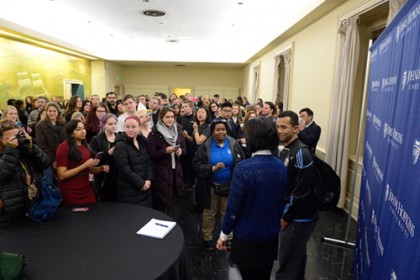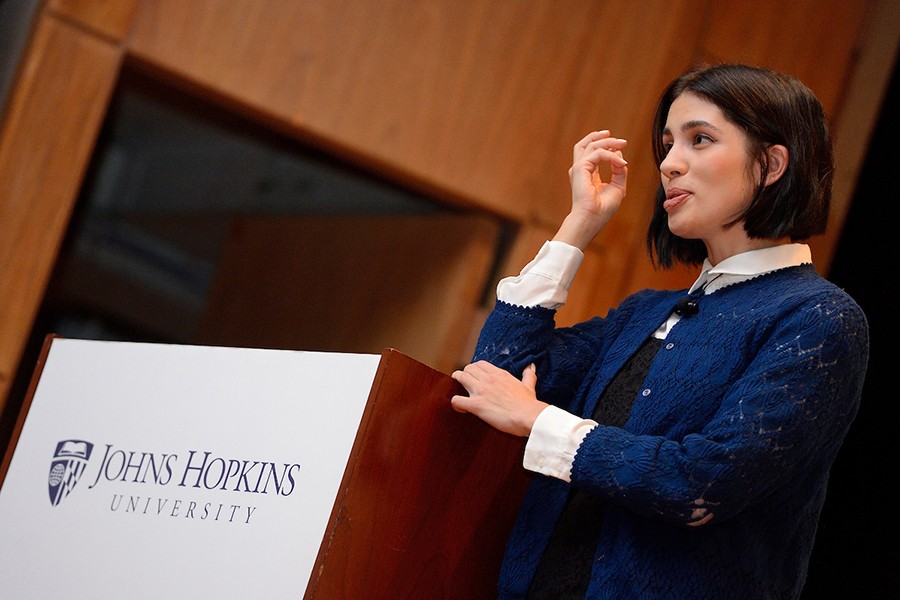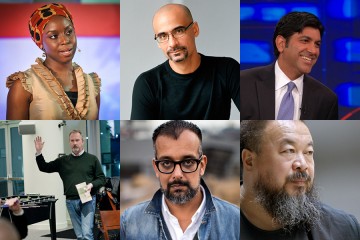Survive and advance.
If there was a single message delivered by Nadya Tolokonnikova—artist, social activist, and co-founder of the Russian punk/protest group Pussy Riot—on Wednesday night, it was that if a citizen finds him or herself living under an authoritarian regime and wishes to resist or change it, don't panic. Acknowledge and respect the forces that might have created an opportunity for, say, a blustery oligarch to rise to power, then take the time to engage in radical political analyzing in order to figure out what to do next.
After all, it's not like Tolokonnikova knows what it takes for dissent to unseat power.
"Look at me, I'm first of all a failure," she said. "I failed in Russia and I was in prison for two years and [President Vladimir] Putin is still in place."
The 27-year-old Tolokonnikova, who spoke in front of a capacity crowd at Johns Hopkins University's Shriver Hall on Wednesday to kick off the 2017 Foreign Affairs Symposium, was self-deprecatingly alluding to her own infamy as one of three Pussy Riot members who were convicted of hooliganism for performing the song "Mother of God, Drive Putin Away" inside Moscow's Cathedral of Christ the Savior church in February 2012.
This mix of humor, perspective, and understanding that social change is a slow, long process made her talk a refreshing tonic to the contentious and often absolutist present-day American political landscape. The subject of President Donald Trump couldn't be ignored—her talk was preceded by a screening of the satirical, NSFW music video of "Make America Great Again"—but in her talk, Tolokonnikova steered away from overselling Putin comparisons and spoke more like an activist thinking aloud about what the next few years could look like.
She said that she's often asked how people should survive the current political climate.
"I think this question is morally wrong at its core," she said. "Think about those who are most vulnerable, who are going to suffer most from Trump's presidency. Think about ways to help them, and you realize this will actually help you."
That perspective pivot is one of political activism's basic building blocks, and it was a reminder that Tolokonnikova is still very much forming and shaping her own political ideas. Her talk wandered through her own experiences—she admitted that she started reading more books on politics after getting out of prison, and she often used a personal anecdote to circle back around to make a larger point. She explained that many of the women she was in prison with were incarcerated for domestic violence, women who finally fought back after years of abuse. She said that while Russia has self-defense laws, women who retaliate often don't have evidence of abuse to present to qualify why they were fighting back. She added, in a moment of chilling humor, that these women are often told that if an abuser killed them, then he could be charged with murder.
The point of this story isn't merely that women are being abused; it's that the legal system is set up to silence women's opposition. And the persuasive clarity of her thinking through her ideas onstage Wednesday night shrewdly mixed the personal with the political to show how they can't be separated.
That's not a trivial point to make. It's far too easy to forget that before the 2012 performance, trial, and prison sentence made Tolokonnikova an international cause célebre—or bête noire, depending on your political orientation—she was a 23-year-old former Moscow State University philosophy student and mother of a 4-year-old girl. Getting arrested for participating in a protest staged by the activist group she co-founded only seven months previously gave her a media platform, and ever since she's been exploring what form her activism is going to take and what it's going to say.

Image caption: Tolokonnikova met with members of the audience following the talk
Image credit: Will Kirk / Johns Hopkins University
Part of that included helping to launch MediaZona, and independent source for news in Russia. Part of that is writing opinion pieces, such as an op-ed for Billboard titled "In Case of Political Catastrophe". Part of that is her own art and music.
"I make videos, but not everyone has to do the same," she said in response to an audience member's question about whether it's better to protest as a person inside or outside institutions. "You just have to understand you must be braver and stronger if you're inside the system."
And that might mean forming and shaping political actions and ideas that have nothing to with the current administration. She argued that Trump is a symptom of a larger problem and quoted Thomas Piketty's Capital in the Twenty-First Century: The inescapable reality is that wealth is so concentrated that a large segment of society is virtually unaware of its existence, so that some people imagine that it belongs to surreal or mysterious entities.
For her, part of the activism going forward needs to focus on demystifying how that concentrated wealth sustains and maintains its economic and political power, a demystification that needs to take place across borders, across genders, across sexual orientations, and so on.
"We need a class-based movement for justice, and it must not just be over Trump but over all the democracy leadership," Tolokonnikova said. "I am for the free movement of people, but how can you make modern globalism internationalism, truly?"
Posted in Arts+Culture, Politics+Society
Tagged foreign affairs symposium









